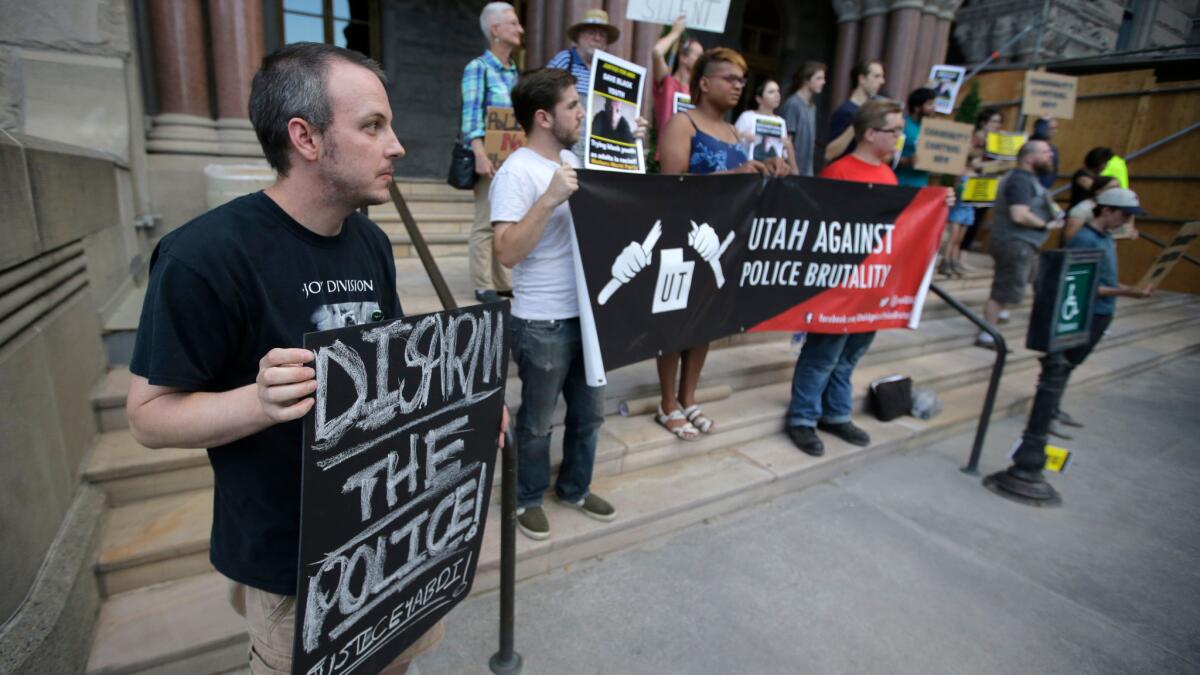Opinion: Opinion: America’s law enforcement problems run much deeper than brutality

- Share via
Happy Labor Day weekend, everyone. This is Matthew Fleischer, digital editor of The Times Opinion section, filling in for Paul Thornton.
Labor Day is always bittersweet. Summer and its warm nights are almost at an end. And yet the return of America’s great secular religion is at hand: football.
This year, however, it will be a little more difficult to idly sit back with a beer and a burger and flip on the game, thanks to San Francisco 49ers quarterback Colin Kaepernick — who dragged the world of sports kicking and screaming into America’s conversation about race with his refusal to stand for the national anthem to start his team’s games. Kaepernick’s protest was designed to bring attention to the issue of police brutality in America — a grave and seemingly intractable problem.
And yet America’s law enforcement issues are far more sweeping than its occasional violent encounter between police and citizens. In an op-ed for The Times, Regent Law School professor James Duane writes about how police interrogation methods routinely elicit false confessions from innocent men and women.
When confronted with police officers and other government agents who suddenly arrive with a bunch of questions, most innocent people mistakenly think to themselves, “Why not talk? I haven’t done anything. I have nothing to hide. What could possibly go wrong?”
Well, among other things, you could end up confessing to a crime you didn’t commit. The problem of false confessions is not an urban legend. It is a documented fact. Indeed, research suggests that the innocent may be more susceptible than the culpable to deceptive police interrogation tactics, because they tragically assume that somehow “truth and justice will prevail” later even if they falsely admit their guilt. Nobody knows for sure how often innocent people make false confessions, but as Circuit Judge Alex Kozinski recently observed, “Innocent interrogation subjects confess with surprising frequency.”
It happens especially in cases when the suspect is young and vulnerable. An analysis of 125 proven false confessions found that 33% of the suspects were juveniles at the time of arrest, and at least 43% were either mentally disabled or ill. Another study of 340 exonerations found that 13% of adults falsely confessed compared to 42% of juveniles. And nearly half of the exonerated children were put behind bars because of something they said to police without an attorney present.
In Oakland, police isolated and interrogated a 16-year-old named Felix in the middle of the night without a lawyer and denied his requests to see his mother. Eventually he gave them a detailed, videotaped confession to a murder, allegedly filled with numerous specifics only the real killer would have known. At that point, it looked like there was little chance this young man would be able to avoid a conviction; when a jury hears that someone has confessed, they are almost certain to convict. But fortunately for young Felix, it was later revealed that he had an airtight alibi: He had been locked up in a juvenile detention facility the day of the killing. The charges were dismissed, and he was released from jail.
Despite the obviousness of the problem Kaepernick diagnosed, the quarterback has been attacked by no less than the likes of Donald Trump — for being somehow disrespectful to America. The Times editorial board says Kaepernick has the right to say and do as he pleases. Oh, and wait a minute, Mr. Trump. Aren’t you the nominee whose entire candidacy is based on the notion that America is no longer great? L.A. Times
Perhaps the most poisonous critique of Kaepernick’s stand is the idea that his wealth and fame make it hypocritical of him to comment on an issue that doesn’t concern him directly. If you think Kaepernick is somehow immune from dangerous police interactions, think again. L.A. Times
The upcoming film “Birth of a Nation” boldly tackles the issue of rape. It’s director Nate Parker, however, was accused of sexual assault over a decade ago. Actress Gabrielle Union stars in the film — and is also a rape survivor. She bravely negotiates an unwinnable situation to tell her story. L.A. Times
Can we more aggressively punish perpetrators of sexual assault, without unfairly targeting minorities and expanding America’s cycle of mass incarceration? Perhaps, but the solution isn’t so easy as some would suggest. National Review
America’s national park system turned 100 this week. Something to work on in the next 100 years? A near total absence of people of color in our wilderness areas. L.A. Times
Follow the Opinion section on Twitter @latimesopinion and Facebook.
A cure for the common opinion
Get thought-provoking perspectives with our weekly newsletter.
You may occasionally receive promotional content from the Los Angeles Times.




